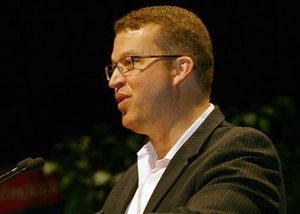
Author John Hart says he tries to approach every book he writes “as an act of trust and faith.” Hart, a Salisbury native, came home on Thursday, March 19, to deliver the keynote address to Catawba College’s 29th annual Brady Author’s Symposium and seemed to enjoy the time he spent in the Robertson College-Community Center among his faithful readers, fans and friends as much as they did.
Hart is the author of four New York Times bestsellers, “The King of Lies,” “Down River,” “The Last Child” and “Iron House”. The only author in history to win the best novel Edgar Award for consecutive novels, Hart has also won the Barry Award, the SIBA Book Award for Fiction and the Ian Fleming Steel Dagger Award for best thriller of the year. A former defense attorney and stockbroker, today he is pursuing his passion as a full-time writer.
“I never much cared for keeping hours or having to be someplace at a certain time,” he explains. “For me it [writing] is the ultimate expression of freedom. Writing is so personal, so lonesome, until it gets to a publisher.
“I wish my kids could be here to see me today to see that I have a real job. They just see me go down to my basement in my bathrobe in the morning and wander back up and get dressed around lunch time.”
Hart’s road to becoming a published author was not without difficulties or setbacks. This Davidson College graduate who went on to earn his law degree hated his career as a lawyer and wanted desperately to become a writer. He penned two failed novels before he quit his job as a criminal attorney at age 35 and wrote his first published novel, “The King of Lies,” in a carrel at the Rowan Public Library.
Although he found a publisher for “The King of Lies,” the money he made off the novel was not enough to allow Hart to pursue writing as his fulltime occupation. He shares that his advance for this novel was a mere $7,500 – “not substantial enough to convince me my life was about to change.”
He says he wrote about what he knew, life in Rowan County. And his knowing about his home county and his hometown made its way onto the pages of “The King of Lies” and into his second novel as well.
“I literally grope and hope,” he shares. “I start with the vaguest of ideas and feel my way through a story. I visualize scenes and have faith in myself to build on that scene.”
Setting his first two novels in Rowan County created a few difficulties for him. Some people who read these books saw themselves in his character portrayals and took offense. Hart set his third and fourth novels in a more fictional place – Raven County, which he described as being a little farther to the east in North Carolina, where the Sandhills meet the Piedmont.
Hart describes how his stature as an author changed from his experience writing, titling and publishing his first novel to his experience writing, titling and publishing his fourth.
“It is interesting for me to watch the growth of careers by the size of the authors’ names on the front of their books,” he says, noting the size of the author’s name increases in relation to the size of the novel’s title as the author becomes more known, read, and a more of his or her novels sold. This is true of Hart’s novels as well.
“The King of Lies” he recalls he wanted to title as “Ezra’s Wake,” but Hart’s wish was overruled by those working on his behalf at his publisher, St. Martin’s Press. It was only with his third novel, that his publishers’ marketing team deferred to him on his title preference and allowed his third novel to be titled, “The Last Child,” as he suggested.
Hart describes his characters as “regular people trying to get through difficult circumstances.” He is particularly fond of “characters who were dramatically impacted by something in their childhood.”
“You cannot in my mind plot a novel until you know your characters. I have to go to bed thinking about the characters and wake up thinking about them.
“A lot of people accuse me of writing dark and I do, so that these great things that make humanity shine so brightly can shine even brighter.”
Hart also believes “family matters” and allows familial themes to hold sway in his novels. “I write about family because in families “hurts linger longer.”
While Hart shares that his fifth novel has been written and is now in the hands of his publisher being prepared for publication sometime in 2016, he also notes that this fifth novel did not come easily to fruition. He says he started what he thought would be his fifth novel, penned 300 pages, and “didn’t like any of it.”
“I was wasting months trying to fix it and it didn’t work. I asked my publisher to forgive me and allow me to start over, and God bless them, they did. What I realized about that failed novel was that it didn’t have the right main character.”
Hart hopes his readers will believe his soon-to-be published fifth novel does have the right main character – a very different main character from his previous novels. This one, he confides, is a female, his first female protagonist. He says he took a risk in creating her and cannot wait to see how his readers receive her.
“I set challenges for myself in every book I write because I don’t want to become pedantic, predictable or boring. She [this female protagonist] is now the beating heart of the novel.”
And like Hart’s male protagonists before her, this female main character, he assures, will also be a complex person who is damaged.
